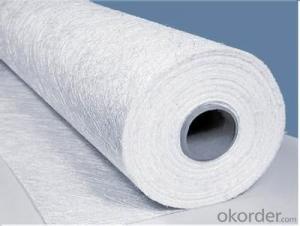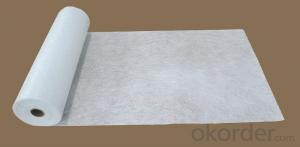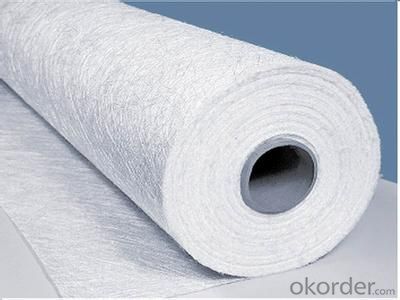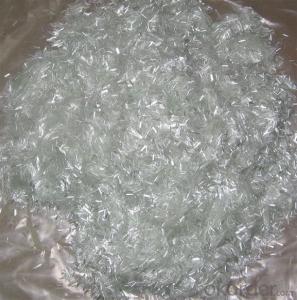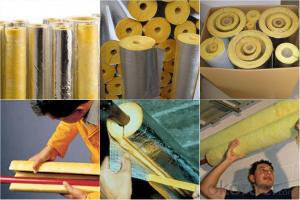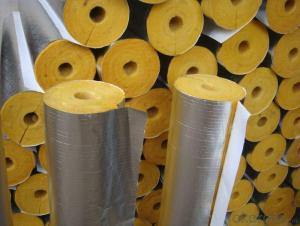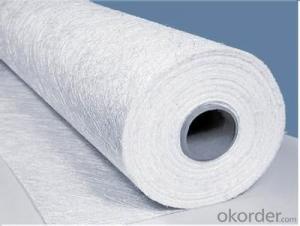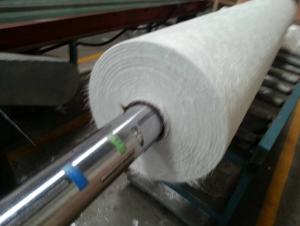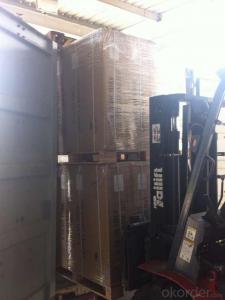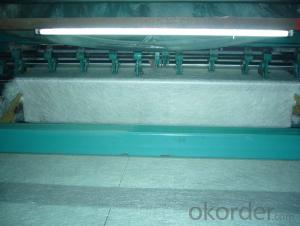Fiberglass Mat Tissue E Glass Fiber Chopped Strand Mat for Hand Layup
- Loading Port:
- Shanghai
- Payment Terms:
- TT OR LC
- Min Order Qty:
- 20000 kg
- Supply Capability:
- 200000 kg/month
OKorder Service Pledge
OKorder Financial Service
You Might Also Like
1.Brief Introduction
E-Glass Chopped Strand Mat for hand layup is made of randomly distributed chopped strands held together by a powder binder or emulsion binder.
It is compatible with UP, VE, EP, PF resins.
The roll width ranges from 50mm to 3300mm.
Additional demands on wet-out and decomposition time may be available upon request.
2.Product Features
Fast breakdown in styrene
High tensile strength, allowing for use in hand lay-up process to produce large-area parts
Good wet-through and fast wet-out in resins, rapid air lease
Superior acid corrosion resistance
3.Product Specifications
Property | Area Weight | Moisture Content | Size Content | Breakage Strength | Width |
(%) | (%) | (%) | (N) | (mm) | |
Property | IS03374 | ISO3344 | ISO1887 | ISO3342 | |
EMC80P | ±7.5 | ≤0.20 | 8-12 | ≥40 | 50-3300 |
EMC100P | ≥40 | ||||
EMC120P | ≥50 | ||||
EMC150P | 4-8 | ≥50 | |||
EMC180P | ≥60 | ||||
EMC200P | ≥60 | ||||
EMC225P | ≥60 | ||||
EMC300P | 3-4 | ≥90 | |||
EMC450P | ≥120 | ||||
EMC600P | ≥150 | ||||
EMC900P | ≥200 |
Special specification can be produce according to customer requirements.
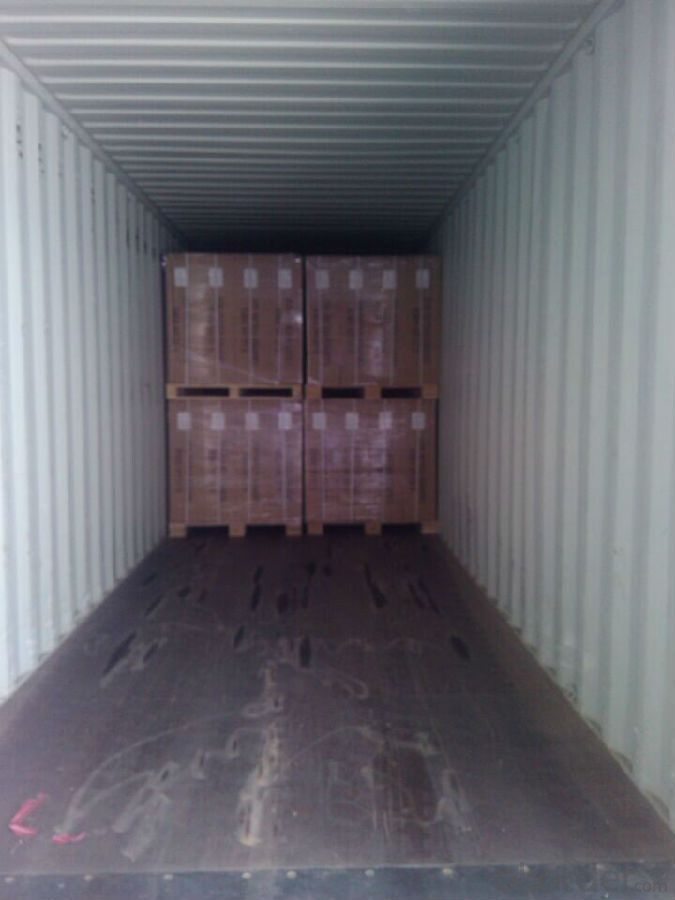
4.FAQ
Packaging:
Each Chopped Strand Mat is wound onto a paper tube which has an inside diameter of 76mm and the mat roll has a diameter of 275mm. The mat roll is wrapped up with plastic film,and then packed in a cardboard box or wrapped up with kraft paper. The rolls can be vertically or horizontally placed. For transportation, the rolls can be loaded into a cantainer directly or on pallets.
Storage:
Unless otherwise specified, Chopped Strand Mat should be stored in a dry, cool and rain-proof area. It is recommended that the room temperature and humidity should be always maintained at 15℃~35℃ and 35%~65% respectively.
- Q: Can fiberglass mat tissue be used for electrical transformers?
- Fiberglass mat tissue can be used for electrical transformers. It is commonly used as insulation material in transformer manufacturing due to its excellent electrical insulation properties. Fiberglass mat tissue is made of fine glass fibers bonded together with a resin, creating a strong and durable material. It is able to withstand high temperatures and has a high dielectric strength, making it suitable for use in electrical transformers. Additionally, fiberglass mat tissue is lightweight and flexible, allowing for easy handling and installation in transformer components. It is also resistant to moisture, chemicals, and fire, further enhancing its suitability for transformer applications. Overall, fiberglass mat tissue is a reliable and efficient choice for insulation in electrical transformers.
- Q: What are the factors that affect the diameter of electrospun nanofibers?
- Application of drug controlled release, tissue engineering, the application of biomimetic materials and artificial organs, sensor film principle: electrospinning is a polymer solution (or melt) forming process of fiber in high voltage field, its core is to take charge of the polymer solution or melt flow and deformation in electrostatic field, and then by solvent evaporation or melt cooling and solid...
- Q: How does the density of fiberglass mat tissue impact its performance?
- The performance of fiberglass mat tissue is significantly impacted by its density. This nonwoven material is made up of glass fibers that are randomly dispersed and held together by a binder. Density refers to the number of fibers present in a given volume of the material. Increased density of fiberglass mat tissue generally leads to enhanced mechanical properties and performance. The higher density means there are more glass fibers in each unit volume, resulting in improved strength, stiffness, and durability. This makes the material more resistant to tearing, puncturing, and abrasion, which is especially important in applications where the tissue is exposed to harsh conditions or heavy loads. Furthermore, higher-density fiberglass mat tissue offers superior thermal insulation properties. The increased fiber content allows for better heat resistance, making it suitable for applications that require thermal protection, such as insulation boards or fireproofing materials. Conversely, lower density of fiberglass mat tissue can offer advantages in certain applications. Lower-density tissues are generally more flexible and have better conformability, allowing them to easily adapt to irregular surfaces or complex shapes. This makes them suitable for applications where flexibility or conformability is a primary requirement, such as in the automotive or aerospace industries. In conclusion, the density of fiberglass mat tissue is critically important in determining its performance characteristics. Whether a higher or lower density is preferred depends on the specific requirements of the application, taking into account factors such as strength, stiffness, durability, thermal insulation, flexibility, and conformability.
- Q: Can fiberglass mat tissue be used for automotive repairs?
- Yes, fiberglass mat tissue can be used for automotive repairs. Fiberglass mat tissue is a versatile material that is commonly used in various industries, including the automotive industry. It is often used for reinforcing and repairing auto body panels, as well as fixing cracks, holes, and other damages in the vehicle's body. Fiberglass mat tissue is made up of fine fibers that are bound together with a resin. This composition gives it excellent strength and flexibility, making it ideal for automotive repairs. It can be easily shaped and molded to fit different contours and shapes of car parts, ensuring a seamless repair. Additionally, fiberglass mat tissue is lightweight and durable, which is crucial for automotive repairs. It provides excellent resistance against corrosion, weathering, and other external elements, ensuring the longevity of the repair. It also offers good impact resistance, protecting the repaired area from further damage. Furthermore, fiberglass mat tissue is compatible with various types of automotive coatings, such as primers, paints, and clear coats. This allows for a smooth and professional finish after the repair is complete. In conclusion, fiberglass mat tissue is a suitable material for automotive repairs due to its strength, flexibility, durability, and compatibility with automotive coatings. It is commonly used in the industry for reinforcing and repairing auto body panels, fixing damages, and ensuring a seamless finish.
- Q: What is the thermal resistance of fiberglass mat tissue?
- The thermal resistance of fiberglass mat tissue typically ranges from 0.3 to 0.6 square meters Kelvin per watt (m²K/W), depending on the specific composition and thickness of the material.
- Q: Is fiberglass mat tissue suitable for agricultural applications?
- Yes, fiberglass mat tissue can be suitable for agricultural applications. It is commonly used in the agricultural industry for various purposes such as reinforcement for greenhouse structures, insulation for livestock housing, and even as a material for composting systems. Its durability, strength, and resistance to weathering make it a viable option for agricultural use.
- Q: Is fiberglass mat tissue resistant to chemicals?
- Generally, fiberglass mat tissue is resistant to chemicals. Its composition, comprising fine glass fibers bonded together with a resin, grants it exceptional chemical resistance properties. This resistance enables the fiberglass mat tissue to endure exposure to various chemicals without deteriorating or compromising its structural integrity. Nevertheless, it is crucial to acknowledge that the precise chemical resistance of fiberglass mat tissue may differ based on the type and concentration of the chemical it encounters. Therefore, it is advisable to consult the manufacturer's guidelines or perform suitable testing to ensure compatibility with particular chemicals.
- Q: What is the abrasion resistance of fiberglass mat tissue?
- The abrasion resistance of fiberglass mat tissue is high, making it suitable for applications that require durability and resistance to wear and tear.
- Q: What are the different types of fiberglass mat tissue available in the market?
- In the market, you can find various types of fiberglass mat tissue, each with its own distinct characteristics and applications. 1. Chopped Strand Mat (CSM): This is a commonly used fiberglass mat tissue. It consists of randomly oriented chopped strands of glass fibers held together by a binder. CSM is widely utilized in industries like construction, automotive, and marine due to its excellent strength and cost-effectiveness. 2. Continuous Filament Mat (CFM): Unlike CSM, CFM is made up of continuous strands of glass fibers. This type of fiberglass mat tissue offers enhanced strength and stiffness, making it suitable for applications that require higher performance and durability. 3. Woven Roving: Woven roving is created by weaving parallel rovings together. It provides a higher strength-to-weight ratio compared to CSM and CFM, making it ideal for applications that require additional reinforcement. 4. Surface Veil: Surface veils are lightweight fiberglass mat tissues primarily used for surface protection and cosmetic purposes. They are typically applied as a thin layer on the surface of other fiberglass materials to improve smoothness, appearance, and resistance to cracking or chipping. 5. Stitched Mat: Stitched mat is a type of fiberglass mat tissue where the fibers are stitched together using thread or yarn. This stitching enhances the mat's stability and structural integrity, making it suitable for applications that require enhanced dimensional stability and strength. 6. Composite Mat: Composite mat is a combination of different materials, including fiberglass, polyester, and other synthetic fibers. It offers a unique combination of properties such as strength, flexibility, and resistance to chemicals, making it suitable for a wide range of applications. In conclusion, the market provides a diverse range of fiberglass mat tissues to cater to specific needs and requirements in various industries.
- Q: What are the advantages of using fiberglass mat tissue in construction?
- There are several advantages of using fiberglass mat tissue in construction. Firstly, it provides excellent strength and durability, making it highly resistant to impacts and weather conditions. Additionally, it has a high tensile strength, allowing it to withstand heavy loads without deformation. Fiberglass mat tissue is also lightweight, making it easier to handle and transport. Moreover, it is non-combustible and provides good thermal insulation properties, enhancing the overall safety and energy efficiency of the construction. Lastly, fiberglass mat tissue is cost-effective, as it requires minimal maintenance and has a long lifespan, reducing the need for frequent replacements.
Send your message to us
Fiberglass Mat Tissue E Glass Fiber Chopped Strand Mat for Hand Layup
- Loading Port:
- Shanghai
- Payment Terms:
- TT OR LC
- Min Order Qty:
- 20000 kg
- Supply Capability:
- 200000 kg/month
OKorder Service Pledge
OKorder Financial Service
Similar products
Hot products
Hot Searches
Related keywords
